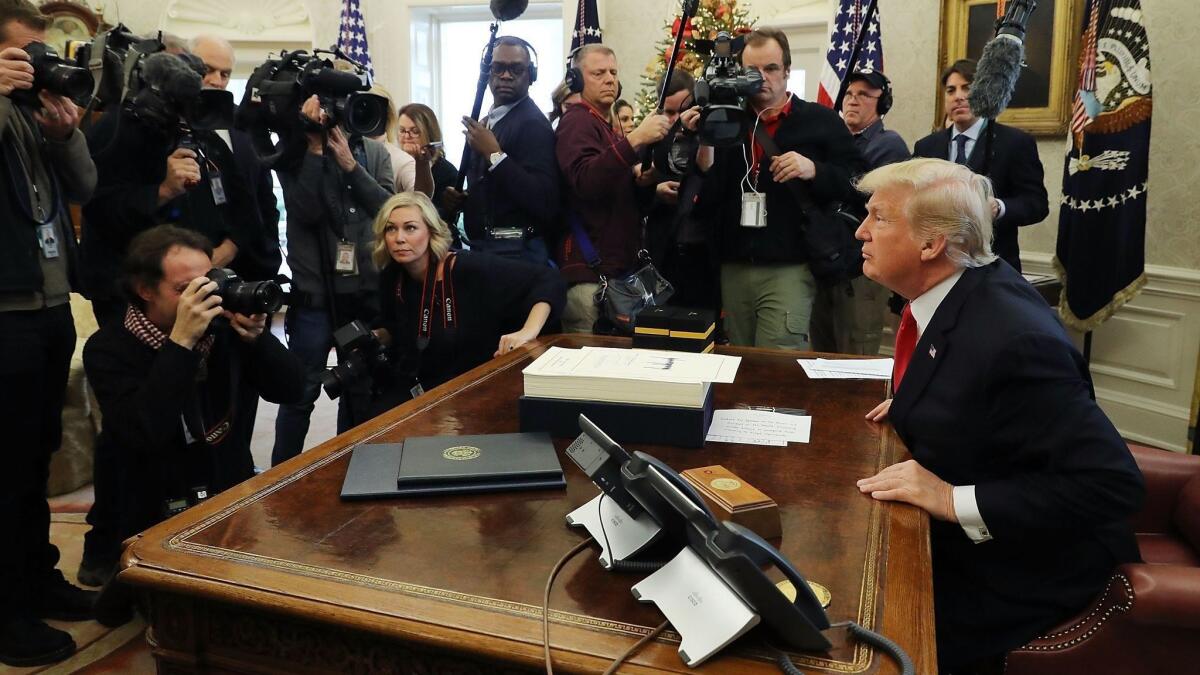U.S. posts largest-ever monthly budget deficit as corporate tax receipts plunge

- Share via
The United States posted its biggest monthly budget deficit on record last month, amid a 20% drop in corporate tax revenue and a boost in spending so far this fiscal year.
The budget gap widened to $234 billion in February, compared with a fiscal gap of $215.2 billion a year earlier. That gap surpassed the previous monthly record of $231.7 billion set seven years ago, according to data compiled by Bloomberg.
February’s shortfall helped push the deficit for the first five months of the government’s fiscal year to $544.2 billion, up almost 40% from the same period the previous year, the Treasury Department said in its monthly budget report Friday. The release was delayed a week by the government shutdown earlier this year.
Receipts dipped less than 1% to $1.3 trillion in the October-February period from the previous year, while spending accelerated 9% to $1.8 trillion.
The fiscal shortfall is widening following President Trump’s $1.5-trillion tax-cuts package that’s weighing on receipts and raising concerns about the national debt load, which topped a record $22 trillion last month.
Federal Reserve Chairman Jerome Powell reiterated his concern over the government deficit in a news conference Wednesday, saying that the nation’s growing debt pile needs to be addressed. At the same time, there’s a shift among some economists — led by proponents of Modern Monetary Theory — on the dangers of a growing deficit, with low inflation and cheap borrowing costs suggesting there’s room for additional spending.
The budget deficit as a share of gross domestic product is expected to widen to 5.1% this year, up from 3.8% a year ago, according to projections from the White House Office of Management and Budget. The shortfall is expected to be 4.9% of GDP in 2020, and further narrow every year through 2024, according to the estimates.
The Treasury data show tax receipts declined for both corporations and individuals in the five-month period, while revenue from customs duties almost doubled, boosted by income from tariffs imposed by the Trump administration.
The 2017 tax law slashed the corporate tax rate from 35% to 21%.
Corporations have so far this fiscal year paid $59.2 billion, compared to $73.5 billion at the point in 2018, when the tax law was only partially in effect for some corporations. In 2017, however, the year before the law was enacted, corporations had paid $87.4 billion at this point in the year.
In a briefing with reporters on Friday before Treasury released the budget data, officials attributed the drop in corporate tax revenues to the front-loading of accelerated expensing and other such items, and reiterated the administration’s view that the cuts would pay off with faster economic growth.
The officials said the administration has been clear the tax cuts would pay for themselves over time, not immediately.
Individual income tax receipts dropped slightly from this point last year, but have risen compared with some years before the tax law. Despite the law cutting tax rates for most people, rising wages and lower unemployment have spurred higher tax revenue.
More to Read
Inside the business of entertainment
The Wide Shot brings you news, analysis and insights on everything from streaming wars to production — and what it all means for the future.
You may occasionally receive promotional content from the Los Angeles Times.










